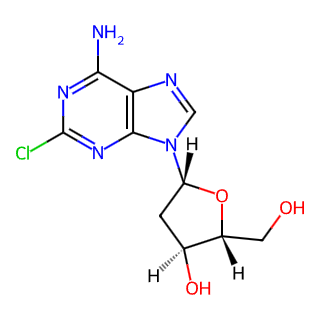- Synthetic anti-infective drugs
- Medications for the digestive system
- Antipyretic and analgesic drugs
- Medications for the blood system
- Medications for the respiratory system
- Anti-allergic drugs
- Medications for the urinary system
- Diagnostic medications
- Immunosuppressive and immunomodulatory drugs
- Vitamins and mineral supplements
- Antioxidants and medications for osteoporosis
- Antiparasitic drugs
- Ophthalmic medications
- Amino acids and their derivatives
- Dermatological medications
- Medications for the circulatory system
- Antitumor drugs
- Medications for the nervous system
- Hormonal and endocrine function-regulating drugs
- Antibiotics
- Others
CAS NO.: 4291-63-8




Cladribine
Introduction:
Cladribine is a purine nucleoside analog that exhibits potent immunosuppressive and antitumor properties. It belongs to a class of drugs known as purine analogs, which are used in the treatment of various medical conditions, including certain types of leukemia and multiple sclerosis.
Key Points:
Chemical Name: Cladribine
CAS Number: 4291-63-8
Molecular Formula: C10H12ClN5O3
Molecular Weight: 285.69 g/mol
Appearance: White to off-white crystalline solid
Mechanism of Action: Inhibits adenosine deaminase, disrupts DNA synthesis, and induces apoptosis in lymphocytes
Pharmacological Action:
Cladribine exerts its effects by inhibiting adenosine deaminase, an enzyme involved in purine metabolism. This leads to the accumulation of adenosine triphosphate (ATP) analogs inside cells, which interfere with DNA synthesis and repair. Additionally, cladribine selectively targets lymphocytes, causing apoptosis (programmed cell death) and immunosuppression.
Clinical Applications:
Treatment of Hematological Malignancies: Cladribine is approved for the treatment of hairy cell leukemia (HCL), a rare form of chronic B-cell leukemia. It has also been studied in other types of leukemia and lymphoma, though its use in these conditions is more limited.
Experimental Therapy for Multiple Sclerosis (MS): Clinical trials have investigated the use of cladribine in patients with relapsing-remitting multiple sclerosis. While it has shown promising results in reducing relapse rates and slowing disease progression, cladribine is not currently approved for this indication in all countries.
Safety and Precautions:
Cladribine can cause serious side effects, including opportunistic infections due to immunosuppression. Therefore, it is essential to monitor patients closely during treatment.
Long-term safety and efficacy data are still being collected, particularly for non-approved indications.
Patients with a history of severe infections, autoimmune disorders, or allergies to cladribine should not receive this medication.

Tai Yau Street, San Po Kong, Kowloon, Hong Kong, China.



